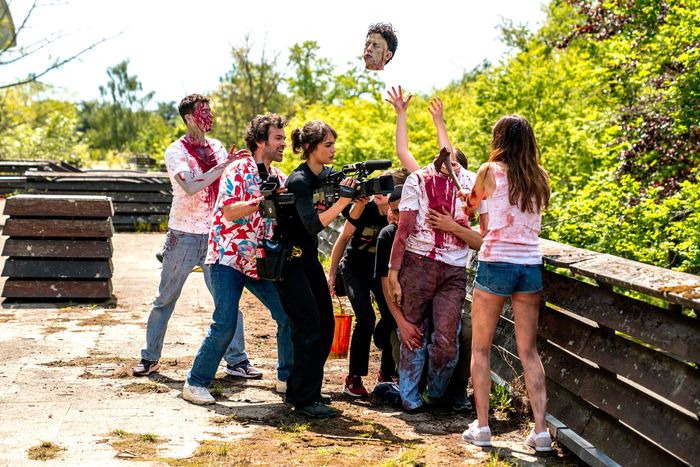
The organizers of the Cannes Film Festival are famed for their programming, but we should also take a second to salute their commitment to counter-programming. For all the festival’s associations with the glittering heights of prestige cinema, Cannes also devotes a few places in its official selection each year for the big, the fun, and the dumb — and not just in out-of-the-way screenings but often in the plum opening-night slot, which in the past has gone to the likes of The Da Vinci Code, The Fifth Element, and Basic Instinct.
Michel Hazanavicius’s Final Cut, this year’s opening film, fits the trend: a silly, lighthearted comedy and, weirdly, the second zombie-tinged comedy in three years to nab this spot, after Jim Jarmusch’s The Dead Don’t Die in 2019. (Like a teenager in the late aughts, is Cannes simply going through its zombie phase, or a subconscious sign that, after last year’s COVID-afflicted fest, things are returning to normal?) It’s a French remake of the 2017 Japanese film One Cut of the Dead, a micro-budget indie that found an audience through the festival circuit. Hazanavicius’s film has a bigger budget, and more stars, but it retains the original’s structural conceit, which I will not spoil except to say that it begins as a one-take project about a film crew on a zombie movie encountering a real zombie apocalypse. As the shot goes on, it might become apparent to the audience that the artistic quality of this film lags far below Cannes’s usual standards. The whole thing is oddly stilted, even amateurish at times. Is Hazanavicius still coasting off his Oscar win for The Artist, or is he up to something?
“I am prepared to be booed,” Hazanavicius told Vulture over Zoom the week before the festival. “And maybe some whistles around 20 minutes in. After a while, the audience will really wonder, Is it going to be like this for two hours? But maybe there are some elements that are intriguing.”
What I can reveal is that the film eventually unveils its true intention as a love letter to cinema, even the middling sort made by Romain Duris’s director character, a journeyman whose trademark is “fast, cheap, and decent.” These are not the first three words that come to mind when you think of the types of films that play the Grand Théâtre Lumière, but the point of the movie — and of the movie playing at Cannes — is to break down such compartmentalization. “We’re all in the same boat,” Hazanavicius said. “There’s not ‘artists’ and ‘other guys.’ Sometimes you make good movies, and sometimes you fail to make one and you make a bad movie.”
Still, there’s something to the fact that this material was not made with one eye looking toward the Croisette. Final Cut was originally scheduled to premiere at Sundance in January until the Omicron variant forced that festival to go virtual. “To premiere this movie on a computer, that doesn’t make any sense,” the director said. The film’s title has had its own tumultuous journey. In France, it was supposed to be called Z, a reference both to zombies and the French term for B-movies: series Z. Then war crimes got in the way. After the letter came to symbolize support for Russia’s invasion of Ukraine, the Ukrainian Film Institute asked the filmmakers to find a new title. They acceded: It has been changed to Coupez!, which means “Cut!”
It’s a lot of geopolitical weight for one little zombie movie to shoulder. Fortunately, that’s about the only pressure Final Cut, which is competing out of competition, is under. Hazanavicius’s previous three films all screened in competition, and while The Artist was well liked, its follow-up, 2014’s The Search, was notably less so. “You don’t know how people will react. Because you entered the competition, they think, You have to show us that you deserve this wonderful spot,” Hazanavicius said. “Opening night, I come with a big fat comedy. It’s obvious that I want to make people laugh, and that’s it. So it’s a great privilege.”
Perhaps the festival should create its own award to honor films like this. Call it the Palme d’oh?


